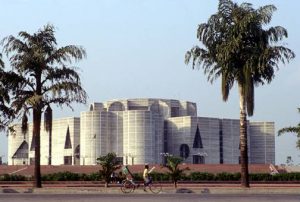
Enemy (Vested) Property Act of Bangladesh is a successor to the Enemy Property Act, 1965 of Pakistan. Before commencement of the Indo-Pak war in 1965, Pakistan declared emergency and promulgated Defence of Pakistan Ordinance on Sep 5, 1965. Under this ordinance, the Pak govt assumed powers to make rules for ensuring security, public safety and defence of Pakistan, and also for securing maintenance of public order. On the same day, the Pak govt framed Defence of Pakistan Rules. Rule 17 of this ordinance authorized the appointment of Controller of Enemy Funds, and Rule 182 authorized the govt to appoint a Custodian of Enemy Property and to order vesting of property in them for preventing payment of money to an ‘Enemy Firm’, and preserving the ‘Enemy Property’. Thereafter the Governor of the then East Pakistan issued a notification ordering that all lands and buildings and other movable properties of the enemies would vest in the Custodian of Enemy Property.
After the Indo-Pak war of 1965 came to an end, the very purpose of vesting the enemy property in the Custodian became defunct but the emergency which was imposed in 1965 continued to remain in force till 1969 when the Pak govt made formal declaration of revocation of the state of emergency stating that the grounds on which emergency was proclaimed ceased to exist. Consequently the Defence of Pakistan Ordinance and Rules also ceased to exist. But, before revocation of emergency, the Pak govt promulgated Enemy Property (Continuation of Emergency Provisions) Ordinance, 1969.
After the emergence of Bangladesh in 1971, a Presidential Order named Law Continuance Enforcement Order, 1971 was promulgated. Under this order, all Pakistani laws which were found consistent with the sovereign status of Bangladesh were allowed to continue to remain in force. Judged from this point of view, there was hardly any justification for continuance of the Ordinance of 1969 which was enacted in view of the then prevailing state of war between India and Pakistan. Moreover, Bangladesh came into being by waging a war against Pakistan and was not a successor to the state of Pakistan or its assets and liabilities. But the said ordinance of 1969 continued to remain in force in Bangladesh virtually reducing the new country to the status of a client agent of Pakistan.
Bangladesh (Vesting of Property and Assets) Order No 29 was promulgated on March 26, 1972 where under properties/ assets which had been vested in the govt of East Pakistan were deemed to have vested in the govt of Bangladesh on and from March 26, 1971. By virtue of this order, all properties and assets which were taken over by the govt of Pakistan and were being managed by the govt of East Pakistan came to be vested in the govt of Bangladesh. Such “vesting” did not imply anything more than the limited rights of custody and management of the properties belonging to the Indian nationals which the govt of Pakistan or the Custodian of Enemy Property had been exercising under the relevant provisions of the Defence of Pakistan Rules and Orders framed there under till such properties were returned to their rightful owners.
In 1974, Bangladesh enacted two laws, namely, Enemy Property (Continuance of Emergency Provisions) (Repeal) Act and Vested and Non Resident Properties (Administration) Act. The first act provided for repeal of ordinance of 1969 with effect from March 23, 1974 on which date the new act was deemed to have come into force and also for vesting in the govt of Bangladesh, all enemy properties vested in the Custodian of Vested Property, and all Enemy Firms, trade or business of which was being carried on by any person appointed or authorized under provisions of Defence of Pakistan Rules. The other act, provided for the constitution of managerial committee for the properties which were vested under the first act as well as properties belonging to any person who has ceased to be a permanent resident of Bangladesh or has accepted foreign nationality.
Ordinance of 1969 of Pakistan should not have continued to remain in force even after the emergence of Bangladesh in 1971 as an independent country. There was a grave error on the part of the concerned authorities of Bangladesh to think that the Ordinance which was enacted in Pakistan on the ground that there was a war between India and Pakistan could continue as a law in Bangladesh. Continuing the provisions of the said ordinance in Bangladesh implied continuation of the war between India and Pakistan as a war between India and Bangladesh and to imply thereby that India and Indian nationals were the enemies of Bangladesh.
For all practical purposes, the Ordinance of 1969 which was promulgated in Pakistan

could not be a valid law in operation in Bangladesh under the Laws Continuance Enforcement Order, 1971. The Ordinance lost all its force and became ineffective with the emergence of Bangladesh. Strangely enough, all properties and assets of the Hindus which were vested in the Custodian of Enemy Property during Pakistan days came to be vested in the govt of Bangladesh which started administering these properties and assets by making appropriate rules. The govt of Bangladesh has since then been dealing with the properties of the Hindu minorities as if there had been no emergence of the new country and that the govt of Bangladesh was a clientele state of Pakistan to carry out laws made by the latter. At a time when there was no war between India and Bangladesh, the sole purpose of enacting the Enemy Property Act appears merely to provide legal basis for the continuance of administration and management of the Hindu properties and firms which were earlier taken over by the govt of Pakistan.
Enemy (Vested) Property Ordinance Resistance Committee which was formed in 1980 put up organized resistance against taking over of Hindu property by Bangladesh govt as vested property. On persistent representations from this committee, the then President Ershad issued an order that no new property could be listed as vested property. He also assured that vested properties would be guided by the personal law of the Hindus. But despite this assurance, the properties belonging to the minorities continued to be enlisted as vested property. This order was observed in its violation from the very inception. The resistance committee raised voice against the issuance of fresh order for enumeration of enemy property and sale of such properties through auction. The resistance committee also held meetings against fresh attacks on the rights of the minority committee. No political party, not even the Awami League (AL) or the left parties came to their aid. Even during the brief interregnum (1996-2001) when AL was in power the Enemy Property Act was not revoked as the bureaucracy and the Army continued to be dominated by the pro-Pak elements.
Enemy (Vested) Property Act is a pernicious law under which thousands of Hindu families have been evicted or are in the process of being evicted from their ancestral properties. This is the only law in Bangladesh which makes distinction on the basis of religion. This raises fundamental issues like violation of human rights, appropriation of properties, violation of the principles of the laws of inheritance as per tenets of the Hindu Law of Succession, discrimination between communities on grounds of religion to undermine the basic principles of national unity. Though Bangladesh signed the Charter of the Universal Declaration of Human Rights, the continuance of this act has been depriving the Hindus of their own property in gross violation of the Charter of Universal Declaration of Human Rights.

It is very sad to learn of the plight of the Hindus in Bangladesh where they are being subjected to torture and harrassment because of their religion.
This shows poorly of the country’s policies inspite of the fact that it would not have been possible for the country to emerge as an independent country without India’s help.
This is really sad that Bangladeshi Hindus are being discriminated against. The govt should do something about it
Thank
Aby
My heart weeps for the Bangladeshi Hindus. Its really sad.
Bangladesh somwhow feels India is its enemy inspite of the fact that India helped it gain independence.
John
Hi! I like your srticle and I would like very much to read some more information on this issue. Will you post some more?
stimulus ibll renewable energy…
An interesting post by a bloger made me ……
My cousin recommended this blog and she was totally right keep up the fantastic work!
… eloo every1… well thats bangladeshi ppl for you… islam says respect all religion but ppl like me and you for there personal gane they fight against religion… may allah give them hedayaa… ameeenn
I feel sorry for HINDUS.
this is not true thatBangladeshi Hindus are being discriminated against, there are a lot of other religous ppl who is in the same position. especial little kids. yes bangladesh has very bad politic, those people are only care about their positon not about the country or publics.
If any one of you visits Bangladesh you will find a different picture there as opposed to the article. Bangladesh Muslims are generally very open and friendly with any other believers. We have seen riots and killings of minorities in India and Pakistan, but not in Bangladesh of that proportion. We born, played with and went to schools with Hindus and Christians and we all were friends. Some time we found horror pictures as well, but those were not targeted to Hindus or Christians only, they targeted also poor Muslim as well and done by powerful political thugs. Most of the Hindus, who left Bangladesh for India sold their properties to powerful Muslims. Sometimes they sold their properties at a very cheap cost so that the money will be transferred to India and will be escorted to India safely. Sometimes they sold the same property to several persons. Some could not sale their properties and fled under the cover of night, since they were carrying their valuables with them in fear of robbing from gangs. The same goes for Muslim who left India for Bangladesh after 1947. Can these Muslims demand their property right from India after so many years? Is it not the same demand of Saddam Hussain’s on the property right of Kuwait?
Whatever the case may be, please don’t blame Bangladeshis, they are much more friendlier than any other nation of that subcontinent. We love our friend of other believers equally.